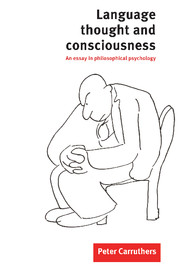Book contents
- Frontmatter
- Contents
- Preface
- Introduction
- 1 The geography of the issues
- 2 Which language do we think with?
- 3 Thought-based semantics
- 4 Holism and language
- 5 First steps towards a theory of consciousness
- 6 Second (-order) steps towards a theory of consciousness
- 7 A reflexive thinking theory of consciousness
- 8 The involvement of language in conscious thinking
- Conclusion
- References
- Index
3 - Thought-based semantics
Published online by Cambridge University Press: 01 June 2011
- Frontmatter
- Contents
- Preface
- Introduction
- 1 The geography of the issues
- 2 Which language do we think with?
- 3 Thought-based semantics
- 4 Holism and language
- 5 First steps towards a theory of consciousness
- 6 Second (-order) steps towards a theory of consciousness
- 7 A reflexive thinking theory of consciousness
- 8 The involvement of language in conscious thinking
- Conclusion
- References
- Index
Summary
If Fodor is to maintain that the language of all thinking is Mentalese, then he must do two things. First, he must give some account of the way in which the semantics of natural language is inherited from the semantic properties of our thoughts. Then second, he must provide a semantic theory for the expressions of Mentalese in turn. In this chapter I shall begin by considering another of Fodor's arguments for the view that we think in Mentalese. This will lead us into discussion of the plausibility of Gricean attempts to provide a semantics for natural language in terms of a prior notion of thought, to some version of which Fodor is committed. I shall then consider Fodor's proposed causal co-variance semantics for the terms of Mentalese.
The argument from foreign believers
One of Fodor's more challenging arguments for the claim that the language of all thinking is Mentalese, starts from the obvious fact that speakers of many different natural languages can entertain one and the same thought. In particular, many who are incapable of speaking English can believe that grass is green. In which case, plainly, their belief cannot consist in a relation to the English sentence, ‘Grass is green.’ Rather, if beliefs are relations to natural-language sentences, then each person's belief must be encoded in some sentence of their own language, which bears a suitable similarity-relation to the sentence, ‘Grass is green.’
- Type
- Chapter
- Information
- Language, Thought and ConsciousnessAn Essay in Philosophical Psychology, pp. 73 - 102Publisher: Cambridge University PressPrint publication year: 1996



